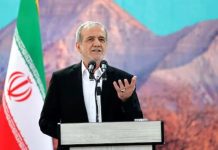DNA
Beijing: July 12, 2024:Federal Minister for Planning, Development and Special Initiatives, Prof Ahsan Iqbal Friday said that by aligning its national strategies with global objectives, fostering regional and international collaboration, driving innovation, and sharing knowledge, the world community could synergize efforts to achieve sustainable development. “It is through these collective actions that we will create a future that is prosperous, inclusive, and resilient,” he made these remarks while speaking at a panel discussion during the Second High-Level Conference of the Forum on Global Action for Shared Development on the topic Sustainable Development: Continuous Actions for a Better Future. Minister Ahsan Iqbal proposed a four-pronged approach: Alignment, Collaboration, Innovation and Knowledge Sharing to align national development strategies with regional and global initiatives to exert joint efforts and achieve comprehensive effectiveness. Explaining his proposals, he said that firstly, aligning national development strategies with regional and global initiatives requires a shared vision. Each country must tailor its national goals to reflect the broader objectives of the Sustainable Development Goals (SDGs) and the GDI. “For Pakistan, this meant embedding the principles of sustainable development into our Vision 2025 framework and our 5Es national economic transformation plan, ensuring that our economic, social, and environmental policies are in harmony with global standards,” he added. The Federal Minister stated that the 5Es plan—encompassing Exports, E-Pakistan, Environment & Climate Change, Energy & Infrastructure, and Equity & Empowerment—aims to create a holistic and integrated approach to development. “By focusing on these five pillars, Pakistan is working towards inclusive growth, efficient resource utilization, and environmental sustainability,” he reiterated. Highlighting the country’s efforts to combat climate change, he said, “Our efforts in green energy, particularly the shift towards renewable sources, directly contribute to global climate goals. By setting national targets that mirror international commitments, we create a cohesive and unified front against global challenges.” About the second proposal, he stated that true synergy is achieved through robust collaboration. Initiatives such as the Belt and Road Initiative (BRI) and the Global Development Initiative (GDI) provide excellent examples of how regional and global collaboration can amplify national efforts. The Minister also pointed out that a prime example of this collaboration is the China-Pakistan Economic Corridor (CPEC), adding that “the CPEC has significantly contributed to sustainable development in Pakistan by enhancing infrastructure, boosting energy production, and creating economic opportunities.” The development of new highways and railways under CPEC has improved connectivity, facilitating trade and economic growth. Additionally, CPEC projects in renewable energy, such as wind and solar power plants, have increased Pakistan’s energy capacity while promoting cleaner, sustainable energy sources. To highlight the importance of public-private partnerships, the Minister said “We must foster partnerships that transcend borders, encouraging public-private partnerships, and engaging civil society and academia.” He further added “By doing so, we harness a wealth of knowledge and resources that drive sustainable development.” The minister said, “We must collaborate for the reform of global financial structures which was carried out after WWII and is out of step with the new global realities and development challenges. He also said that innovation is the new paradigm for development and the key catalyst for sustainable development. Investing in research and development, and promoting technological advancements, particularly in areas such as clean energy, agriculture, and digital infrastructure, can accelerate progress towards sustainable goals. China’s recent strides in digital economy and e-governance are examples of how innovation can lead to greater inclusivity and efficiency, he added. To foster innovation, it is crucial to create an enabling environment that supports technology enablement, enabling regulations, startups ecosystem and encourages investment in sustainable technologies. Furthermore, the federal minister emphasized on the importance of joint research between different countries. “AI is changing everything. International cooperation in this realm, such as through technology-sharing agreements, joint research initiatives and inclusive global governance can bring about groundbreaking solutions to common challenges.” Emphasizing upon his fourth proposal, he said that knowledge sharing is vital for learning from each other’s experiences. “By creating platforms for dialogue and exchange, we can share best practices, lessons learned, and innovative solutions. This mutual learning process enables countries to adopt successful strategies and avoid common pitfalls,” he added. Federal Minister Ahsan Iqbal appreciated China International Development Cooperation Agency (CIDCA) for providing this opportunity and playing an important role for knowledge sharing. The minister said that Pakistan has benefited immensely by learning about agricultural techniques from China and other countries, which has improved Pakistan’s energy, food security and sustainability. “Establishing knowledge hubs and facilitating cross-border educational exchanges will ensure that we collectively advance towards our shared goals,” he added. The minister called upon the world community to commit to working together, leveraging each other’s shared strengths and resources, to build a better world for all. During his speech, the minister extended his heartfelt thanks to President Xi Jinping for leading the path of sharing and collaboration, inspiring all the countries to work towards a common goal of sustainable development so that no one is left behind. He congratulated Chairman of CIDCA, Lou Zhaohui for implementing the vision of President Xi.“As President Xi said during first Belt and Road Forum in 2017 that we should build an open platform for cooperation and uphold and grow an open world economy this way we will create a broad platform for BRI and in the spirit of open regionalism, achieve diversified, independent, balanced and sustainable development,” he added.

















